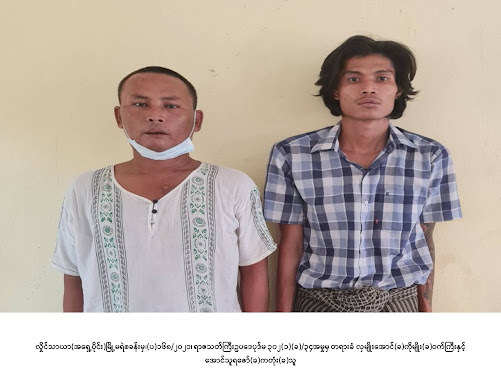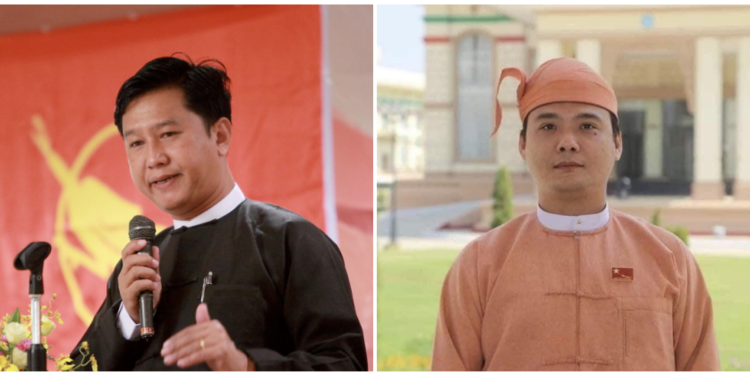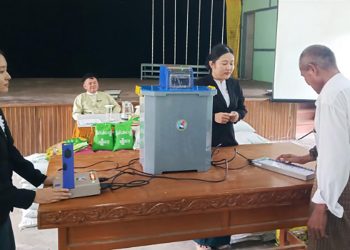Myanmar’s military junta executed former National League for Democracy lawmaker Ko Phyo Zeya Thaw and veteran democracy activist Ko Jimmy over the weekend for their anti-regime activities.
The death sentences were widely viewed as an act of revenge by the junta against opponents of its rule.
The regime announced on Monday that the punishment had been conducted according to procedures at Yangon’s Insein Prison.
They were sentenced to death in January by a military tribunal under Myanmar’s overbroad Counterterrorism Law for masterminding and being involved in the anti-regime armed struggle and related activities.
The men and two others sentenced to death were allowed to meet with their families via video on Friday, prompting fears that the four would be hanged very soon. But the regime’s spokesperson denied the rumors and said the executions would not be carried out in haste as the men had to undergo medical checkups and other procedures.
U Moe Zaw Oo, the deputy foreign minister of Myanmar’s shadow National Unity Government, told The Irrawaddy that the regime had committed an “unforgivable” act, for which there would be serious consequences.
“The junta will have to pay the price legally. The executions have made us more determined to topple the regime,” he said.
Ko Phyo Zeya Thaw was 41. Ko Jimmy, also known as Kyaw Min Yu, was 53 and a former leading member of the 88 Generation Students Group. Both were held dear by the Myanmar people, including the young, for their democracy activism.
A number of countries and international organizations joined local groups in condemning the junta’s execution orders against the men after they were first announced on June 3. Hun Sen, the the prime minister of Cambodia, which currently holds the rotating chair of the Association of Southeast Asian Nations (ASEAN), of which Myanmar is a member, asked junta chief Min Aung Hlaing “to reconsider” and “refrain” from carrying out the execution orders, saying they were causing “great concern among the ASEAN members and its external partners.”

Ko Phyo Zeya Thaw, Ko Jimmy, Ko Hla Myo Aung and Ko Aung Thura Zaw turned out to be the first political dissidents to be executed since ethnic Chin student leader Salai Tin Maung Oo was hanged by dictator General Ne Win’s authoritarian regime at Yangon’s Insein Prison in 1976.
The executions come at a time when the junta continues to struggle to control the country amid widespread armed resistance, and can be viewed as both an act of retaliation and an attempt to instill fear in anyone who would oppose its rule.
Myanmar has been in social and political turmoil since last year’s coup and has slipped into a situation that some UN experts are already describing as a civil war. The regime has so far killed more than 2,000 people simply for rejecting military rule in their country. Backed by popular support, anti-regime armed resistance has mushroomed into a rebellion on a scale the country has not seen since its independence in 1948.
Many have warned that the executions of Ko Phyo Zeya Thaw and Ko Jimmy, and that of the other activists on death row would escalate the ongoing popular resistance against the junta and bring about all-out war.
“He always does what he thinks is right. Nothing can stop him from his pro-democracy activism. People like him and Ko Jimmy aren’t afraid of its [the junta’s] cruelty,” Ma Thazin Nyunt Aung, the wife of Ko Phyo Zeya Thaw, told The Irrawaddy last month.
Ko Jimmy is survived by a 15-year-old daughter and his wife, Ma Nilar Thein, who was herself an 88 Generation Students leader. Ma Nilar Thein is in hiding for her anti-junta activism.
Ma Nilar Thein said in an interview with Radio Free Asia that “The junta will bear full responsibility if my husband is executed.”
Since last year’s coup, the military regime has handed down death sentences to 113 people for their roles in the armed resistance against the junta.

















